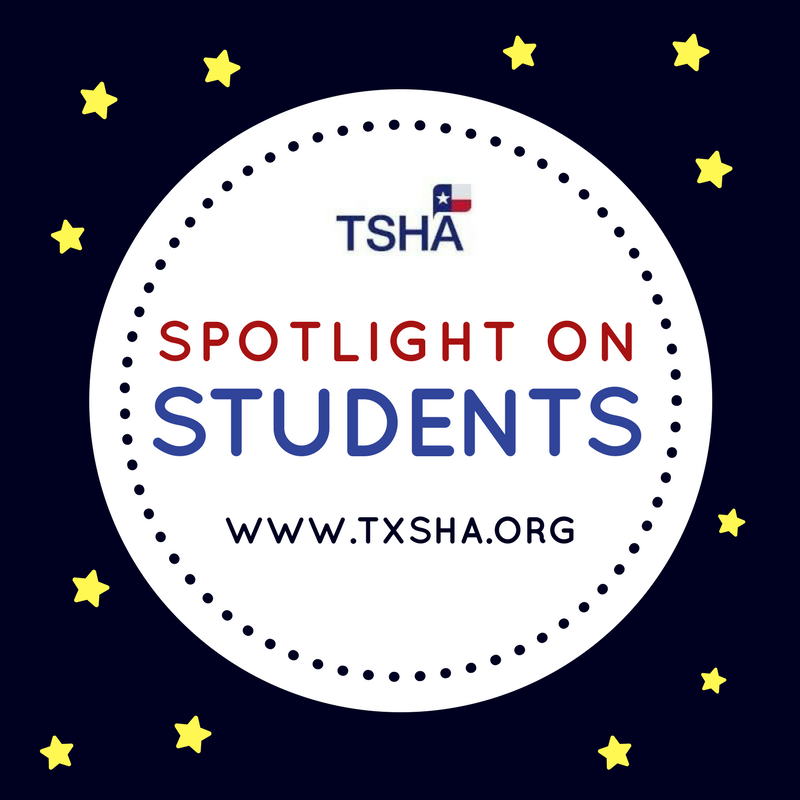
By: Madeline Beck, BA, and Emily Gruver, MS, CF-SLP, TSHA Graduate Student Representatives
Both current Texas Speech-Language-Hearing Association (TSHA) Graduate Student Representatives came from majors in political science. When we came into this field of speech-language pathology—Emily as a second bachelor’s student and Madeline as a graduate student—we had never heard of aphasia, did not know the difference between a fricative or a stop, and had no idea what a mean length of utterance (MLU) was, let alone how to calculate it. However, we did know that this field was the right place for us to be and that our eagerness to learn would make up for what we considered a shaky foundation. We first thought our rather unconventional paths to speech-language pathology would leave us far behind our classmates. On the contrary, every opportunity and experience in this field has helped us become better students, clinicians, and future speech-language pathologists (SLPs) as we add to our unconventional bases of knowledge.
Unconventional students may not have linear paths to the fields of speech, language, and hearing, but their diversity of experiences makes our profession stronger and better able to adapt to the needs of our clients. For these reasons, the speech-language-hearing fields are happy to welcome students from a variety of backgrounds; these professions truly have something for everyone.
First, unconventional students carry skills over from other professions that make them invaluable to this field. Madeline’s first job out of her undergraduate program was teaching middle school science. From lesson planning to leading groups to interacting with families to understanding individualized education program (IEPs), not a day goes by that she does not rely on the skills she gained as a teacher. Teaching crosses over into speech fairly easily, but every job has skills that can make for a good clinician. Emily competed in co-curricular international relations conferences and worked as the manager for a chiropractic office before returning to graduate school, all of which contributed to her ability to think critically, collaborate, and excel at building rapport with clients and families. A former singer has experience with techniques for breath support, a former nurse is already comfortable with medical jargon and patient interactions, and even a former bartender might have good empathy and listening skills. Unconventional experiences lead to greater diversity of clinicians who can connect with a greater variety of clients.
Unconventional students also may be older and have more life experience that serves them well in building relationships with clients. Many, like Madeline, have children of their own, which gives invaluable insight. Her class schedule has lined up quite nicely with her own toddler’s language development; during her language acquisition class, she noticed him babbling in jargon. During her language assessment and intervention class, she used some of the strategies to help him get to two-word utterances. During her articulation class, she watched him suppress the phonological process of final consonant deletion. Having a child of her own makes the information she learns immediately salient for her.
Parents also may be able to empathize more readily with clients’ parents. “While my child is typically developing and I do not understand the experience of receiving a life-altering diagnosis for him, I do know what it is like to plan for your child and want the best for him, despite any challenges he faces,” Madeline said. This is just one aspect of life and relationships in which unconventional students have additional insight. They can not only be better clinicians themselves because of it but also can offer that insight to their fellow classmates, improving the learning of everyone.
Finally, unconventional students bring new perspectives on speech. Our undergraduate degrees are in the not-so-related field of political science. We frequently hear from advisors and classmates, “So poli-sci…. How did you end up here?” Despite our thinking that political sciences would not have much of a connection to speech, when some of our first classes talked about the intersectionality between speech and culture, we felt right at home. Topics that might have been new or uncomfortable to other students are ones that unconventional or out-of-field students may have already explored extensively in previous studies. Clinicians with a variety of backgrounds can hasten the changes our professions need to continue meeting the needs of our increasingly diverse clients. Unconventional students bring fresh ideas and perspectives to how we do things and can make changes for the better.
To anyone considering a change, know that speech-language pathology and audiology have something to offer you, whether it is research, clinical practice, or both.
Of course, these fields still need and thrive on the just-out-of-undergrad students who decided their career path early and stuck to it. Those students are as eager to learn, grow, and help others as their non-traditional classmates. To those of you who have only ever studied speech, language, and hearing, we are envious that you found these amazing fields so quickly in your lives and are grateful for all we have learned from you. If you have known for years that speech is the career for you and have followed that plan, you are so needed in these fields. But if, like us, you took a few more years to figure out exactly where you were meant to be, you also are so needed in these fields. As the demand for SLP and audiology services increases and the population we serve becomes more diverse, a diversity of experiences in our clinicians is just what we need. These fields can offer a home to anyone and everyone, and we are thankful that our backgrounds led us to this point. Our education has now made us comfortable with aphasia, fricatives, and MLU, but we still consider our non-speech experiences to be wonderful assets.